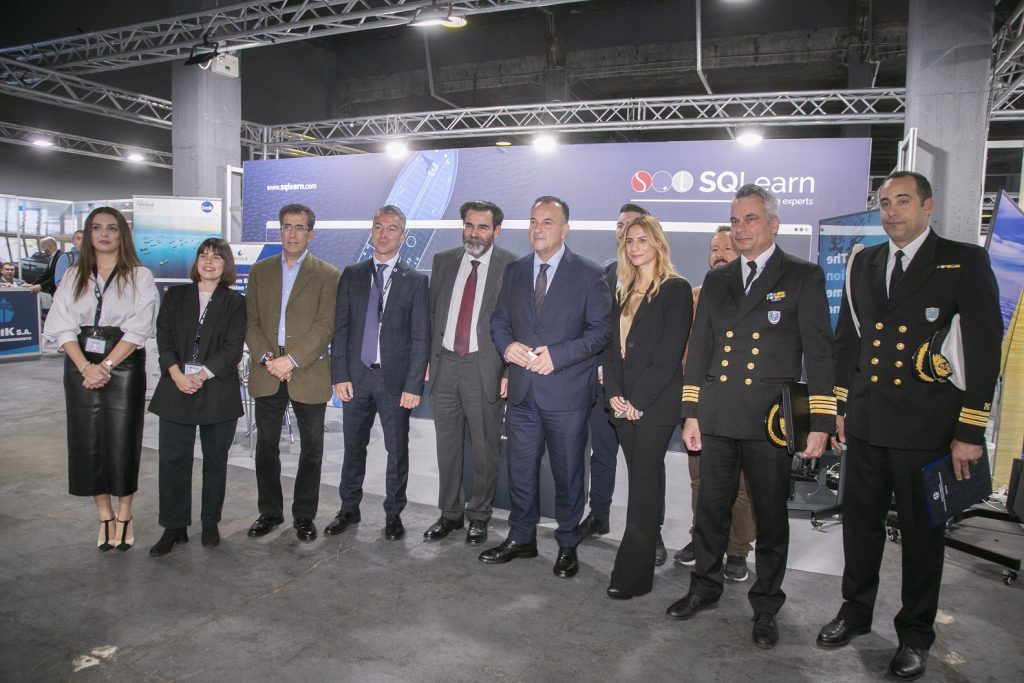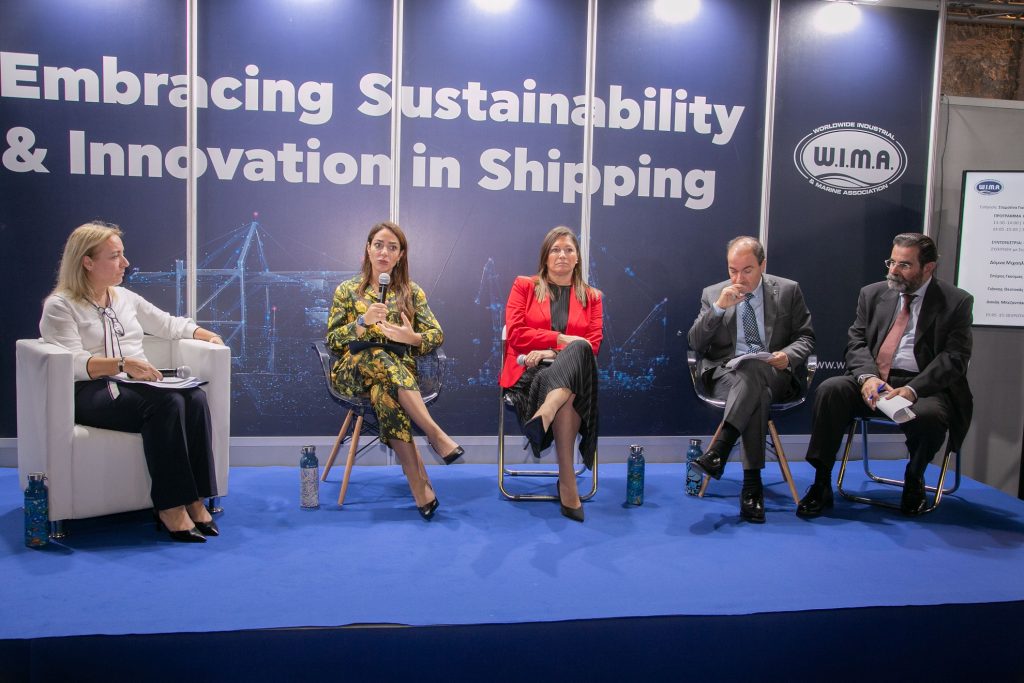SQLearn presented its innovative services at WIMA’s “Embracing Sustainability & Innovation in Shipping” Exhibition, in Piraeus
Company’s President & CEO Mr. Spyros Goumas addressed the challenge of using e-learning as a tool for sustainable development during a panel discussion on “Human Resources in Shipping – Technology & Challenges”

SQLearn, the leading maritime training expert, presented its innovative services and emphasized the role of e-learning for shipping companies’ personnel in fostering sustainability within the industry during its participation in the two-day Exhibition of WIMA (Worldwide Industrial & Marine Association), titled “Embracing Sustainability & Innovation in Shipping”, which was held with great success at the Stone Warehouse of the Port of Piraeus, on November 22 and 23.
SQLearn, together with other 35 WIMA member companies, presented its products and services at its stand at the Exhibition, which was visited by a large number of people, including the Deputy Minister of Shipping and Insular Policy, Mr. Ioannis Pappas, representing the Prime Minister, the Deputy Minister of Education, Religion and Sports Mrs. Domna Michailidou, representatives of the Municipal Authority and stakeholders of Piraeus, executives of the shipping industry, as well as a large number of young people.
At SQLearn’s stand, visitors had the opportunity to try VR Maritime Training, an educational application based on virtual reality technology, and to learn more about the company’s innovative services in the field of maritime distance education. The stand was also visited by students of the Perama Naval High School, to whom SQLearn’s educational tools were presented by Mr. Sakis Bourlios, Account Manager of the company.
The presence of SQLearn was also significant in the panel discussion on the topic “Human Resources in Shipping – Technology & Challenges” organized on the second day of the Exhibition, with the participation of the Deputy Minister Ms. Domna Michailidou, Ms. Danae Bezadakou, CEO of Navigator Shipping and Founder of the YES Forum, Dr. Ioannis Theotokas, President of the Department of Maritime Studies of the University of Piraeus, and Mr. Spyros Goumas, President & CEO of SQLearn and Member of WIMA’s Board of Directors. The discussion was moderated by Ms Olga Stavropoulou, Director General of HELMEPA.
All speakers emphasized the digital transition of shipping and the challenge for the industry to adapt its human resources to the new reality.
During his presentation, Mr. Spyros Goumas spoke of the “Greek Maritime Miracle”, noting that “WIMA is an association of Greek companies that supports exactly this miracle”. Referring to the training of seafarers and shipping companies’ personnel, he said that “the human resources in the shipping cluster must go through two phases of training: the initial training for the basic degrees and, above all, the ongoing training, which shipping is obliged to do. At least 90% of this process for shipping, is done remotely. Shipping is one of the industries that have adopted this model for many years, due to its nature. Seafarers can only be trained remotely, using technological solutions”.
In response to a question about the available capacity and technology to cover the distance training of as many seafarers as possible, SQLearn’s President & CEO explained that “as time goes on and technologies develop and the Internet gives us greater opportunities, it further strengthens the trend for distance training, so that even all of the 2 million seafarers currently sailing around the world can be trained through e-learning solutions”.
Describing how e-learning model contributes to the sustainability of the industry, Mr. Goumas noted that “as shipping is a global industry, companies have direct international competition. So, if they don’t incorporate the latest technologies, they can’t be competitive. This means that today, as technologies run very fast, shipping companies are obliged to build ships that incorporate all the new technologies. At the same time, the international organizations that shape shipping legislation are incorporating stricter rules over time. Thus, there is a huge problem of monitoring, on the one hand the integration of technology on ships, and on the other hand keeping the staff well-informed about the new regulations. So, you realize that if shipping had not already incorporated e-learning into its daily routine, it would not be able to meet these demands, which are necessary for the industry to continue to operate competitively”.
As a conclusion, Mr. Goumas stressed that “e-learning as a training method has very strict rules and is a very well-organized process, which the Open University of Britain had started 150 years ago and which has now been perfected. Today we are in a phase where technologies help us to further develop this methodology, because we have the opportunity to create simulations, videos that we could not have in a traditional education, i.e., a wealth of educational material. Greece produces innovation and SQLearn is a global pioneer in innovative tools for distance maritime education”.
In this direction, SQLearn is happy to announce that recently presented the first results of the Ready2Respond Project, which aims to improve maritime education using XR technology. Ready2Respond is supported by Iceland, Liechtenstein and Norway through the EEA and Norway Grants in the frame of the Programme “Business Innovation Greece”. The project promoter is SQLearn and the partner is SINTEF Digital.
The Ready2Respond project will build an XR simulation/4 scenario-based game to engage pupils of maritime schools in Greece and Norway to new, exchiting real-case scenarios. Pupils will be prepared to respond quickly and effectively to demanding and challenging on-board situations and will be ready to operate in difficult situations before performing them.
XR can offer the possibility of repetitive practice, allowing for mistakes to be made and corrected without causing any real-world consequences, which can improve the learning process. The gamification of the XR training can also increase engagement and motivation among the pupils, leading to more effective learning outcomes. By incorporating XR technology into maritime education, Ready2Respond aims to bridge the gap between the demands of the shipping industry and the education offered to pupils in naval schools.
You can find out more about Ready2Respond Project at: https://www.sqlearn.com/ready2respond-project-improve-maritime-education-using-xr/


